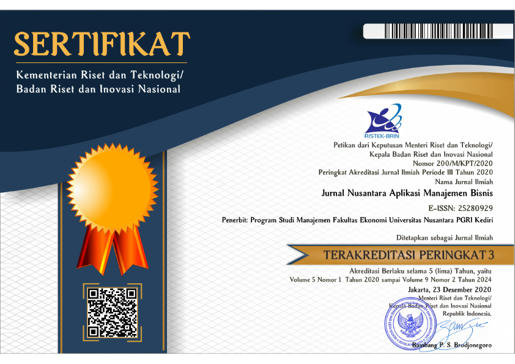Green Organizational Culture as an Emerging Tren : A Bibliometric Analysis
DOI:
https://doi.org/10.29407/nusamba.v10i2.23666Keywords:
Green culture, Eco friendly, Organization performance, Sustaibility, Organizational changeAbstract
Research aim : Conducting a literature review to examine the development of literature from the green culture variable so that a visual mapping is obtained that describes the interrelated relationship between green culture and environmental performance and other variables in several industrial sectors.
Methode : This study employs a quantitative approach, utilizing time series data from the past decade along with bibliometric analysis. From the patterns and trends visualized, it can be known the relationship or correlation between various related factors.
Research Finding : Organizational culture still dominates as a fundamental aspect of green organizational performance, although recent trends point to the broader evolution of the concept of "green" when referring to sustainability missions. Regardless of where the organization is on their journey to sustainability, organizational culture remains key to ensuring that eco-friendly policies and practices can be successfully integrated within all elements of the organization.
Theoretical contribution/Originality : This study contributes to enriching the literature and improving understanding of how green culture affects organizational structures and processes.
Practitionel/Policy implication : The literature on green culture has not been widely researched, this may be because the practice of green cultural transformation is still limited in the field. However, this consensus has great potential to grow as attention to sustainability and environmental responsibility in various sectors, both profit and public sector
Downloads
References
[2] Harrison V. Legitimizing private legal systems through CSR communication: a Walmart case study. Corp Commun 2019;24:439–55. https://doi.org/10.1108/CCIJ-12-2018-0124.
[3] Kementerian ingkungan Hidup & Kehutanan Republik Indonesia. Status Lingkungan hidup indonesia. Indonesia: 2020.
[4] Sydney University. State of the Environment: report findings. Univ Sydney 2022. https://www.sydney.edu.au/news-opinion/news/2022/07/19/state-of-the-environment--the-findings.html (accessed October 6, 2022).
[5] Ahmed F, Ali I, Kousar S, Ahmed S. The environmental impact of industrialization and foreign direct investment : empirical evidence from Asia-Pacific region. Environ Sci Pollut Res 2022;29:29778–92. https://doi.org/10.1007/s11356-021-17560-w.
[6] Kennedy V. Go Green: How To Put Your Business On An Eco-Friendly Path. Forbes 2021. https://www.forbes.com/sites/ellevate/2021/06/29/go-green-how-to-put-your-business-on-an-eco-friendly-path/?sh=1e9e208c6850 (accessed October 13, 2022).
[7] Galpin T, Whittington JL, Bell G. Is your sustainability strategy sustainable? Creating a culture of sustainability. Corp Gov 2015;15:1–17. https://doi.org/10.1108/CG-01-2013-0004.
[8] Roscoe S, Subramanian N, Jabbour CJC, Chong T. Green human resource management and the enablers of green organisational culture : Enhancing a firm ’ s environmental performance for sustainable development. Bus Strateg Environ 2019:1–13. https://doi.org/10.1002/bse.2277.
[9] Bulinska-Stangrecka H, Bagienska A. Culture-Based Green Workplace Practices as a Means of Conserving Energy and Other Natural Resources in the Manufacturing. Energies 2021;14:1–21. https://doi.org/https://doi.org/10.3390/ en14196305.
[10] Liu X, Lin K. Green Organizational Culture , Corporate Social Responsibility Implementation , and Food Safety. Perspective 2020;11:1–7. https://doi.org/10.3389/fpsyg.2020.585435.
[11] Chu Z, Wang L, Lai F. Customer pressure and green innovations at third party logistics providers in China The moderation effect of organizational culture. Int J Logist Manag 2018:0957–4093. https://doi.org/10.1108/IJLM-11-2017-0294.
[12] Sharma S, Prakash G, Kumar A, Mussada EK, Antony J, Luthra S. Analysing the relationship of adaption of green culture, innovation, green performance for achieving sustainability: Mediating role of employee commitment. J Clean Prod 2021;303:1–11. https://doi.org/10.1016/j.jclepro.2021.127039.
[13] Tahir R, Athar MR, Faisal F, Shahani N. Green Organizational Culture : A Review of Literature and Future Research Agenda. Ann Contemp Dev Manag HR 2019;1:23–38. https://doi.org/10.33166/ACDMHR.2019.01.00.
[14] Firoz NM, Abinakad M. Food Safety and ethics in foreign markets. Confl Resolut Negot J 2016;4:63–76.
[15] Muisyo PK, Qin S. Enhancing the FIRM’S green performance through green HRM: The moderating role of green innovation culture. J Clean Prod 2021;289:125720. https://doi.org/10.1016/j.jclepro.2020.125720.
[16] Yang Z, Sun J, Zhang Y, Wang Y. Green information systems, green culture and green innovation effectiveness: A triad model. Pacific Asia Conf Inf Syst 2016:1019.
[17] Atkinson PE. Creating Culture Change. Creat. Cult. Chang., vol. 5, 2012, p. 33–7.
[18] Nordbrandt M, Nikolausson H. Establishing an Environmentally Friendly Organizational Culture. Sweden: 2014.
[19] Wang CH. How organizational green culture influences green performance and competitive advantage: The mediating role of green innovation. J Manuf Technol Manag 2019;30:666–83. https://doi.org/10.1108/JMTM-09-2018-0314.
[20] Rizvi YS, Garg R. The simultaneous effect of green ability-motivation-opportunity and transformational leadership in environment management: the mediating role of green culture. Benchmarking 2021;28:830–56. https://doi.org/10.1108/BIJ-08-2020-0400.
[21] Aggarwala P, Agrawala T. Relationship of green human resource management with environmental performance: mediating effect of green organizational culture. Benchmarking An Int J 2022. https://doi.org/https://doi.org/10.1108/BIJ-08-2021-0474.
[22] Rosiliana NPA, Dewi RR. The Effect of Green Innovation, Green Organizational Culture, Eco-Efficiency and Collaboration on Competitive Advantage. AKUMULASI Indones J Appl Account Financ 2023;2:85–102. https://doi.org/10.20961/akumulasi.v2i2.870.
[23] Singh SK, Giudice M Del, Chiericie R, Grazianof D. Green innovation and environmental performance : The role of green transformational leadership and green human resource management. Technol Forecast Soc Chang 2020;150:1–12. https://doi.org/10.1016/j.techfore.2019.119762.
[24] Weng HR, Chen J, Chen P. Effects of Green Innovation on Environmental and Corporate Performance: A Stakeholder Perspective. Sustainbility 2015;7:4997–5026. https://doi.org/10.3390/su7054997.
[25] Whittington JL, Galpin TJ. The engagement factor: Building a high-commitment organization in a low-commitment world. J Bus Strategy 2010;31:14–24. https://doi.org/10.1108/02756661011076282.
[26] Büschgens T, Bausch A, Balkin DB. Organizational Culture and Innovation: A Meta-Analytic Review. J Prod Innov Manag 2013;30:1–19. https://doi.org/10.1111/jpim.12021.
[27] Li W, Bhutto TA, Xuhui W, Maitlo Q, Zafar AU, Niaz Ahmed Bhutto. Unlocking employees’ green creativity: The effects of green transformational leadership, green intrinsic, and extrinsic motivation. J Clean Prod 2020;255:1–10. https://doi.org/10.1016/j.jclepro.2020.120229.
Downloads
Published
Issue
Section
License
Copyright (c) 2025 Daisy Marthina Rosyanti, Mentari Clara Dewanti, Fani Khoirotunnisa

This work is licensed under a Creative Commons Attribution-ShareAlike 4.0 International License.
Authors who publish with this journal agree to the following terms:
- Copyright on any article is retained by the author(s).
- The author grants the journal, the right of first publication with the work simultaneously licensed under a Creative Commons Attribution License that allows others to share the work with an acknowledgment of the work’s authorship and initial publication in this journal.
- Authors are able to enter into separate, additional contractual arrangements for the non-exclusive distribution of the journal’s published version of the work (e.g., post it to an institutional repository or publish it in a book), with an acknowledgment of its initial publication in this journal.
- Authors are permitted and encouraged to post their work online (e.g., in institutional repositories or on their website) prior to and during the submission process, as it can lead to productive exchanges, as well as earlier and greater citation of published work.
- The article and any associated published material is distributed under the Creative Commons Attribution-ShareAlike 4.0 International License












